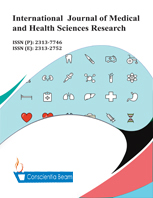Development and Evaluation of the Readability, Stability and Internal Consistency of a Psychometric Instrument Designed to Assess Physiotherapists Knowledge and Attributes of Professionalism
DOI:
https://doi.org/10.18488/journal.9.2017.46.102.117Abstract
Background and Purpose: There is currently no culturally appropriate instrument to assess Nigerian physiotherapists’ knowledge and attributes of professionalism. This study sets out to develop a psychometric instrument to assess the knowledge and attributes of professionalism of Nigerian physiotherapists, and to investigate the instrument's readability, stability, and internal consistency. Methods: A Professionalism Inventory with eight demographic questions, ten knowledge of professionalism questions and sixteen attributes of professionalism perception-based statements was developed. The attributes of professionalism scale assess clinical competence, a spirit of inquiry, accountability, autonomy, advocacy, innovation and visionary, collegiality and collaboration, and ethics and values. The Inventory was completed on two occasions, after two-week interval, by 91 Nigerian physiotherapists. Results: The Inventory’s average grade reading level was 10. The intra class correlation coefficient (ICC 3, 1) for the knowledge of professionalism scale ranged from “moderate” (0.421, p<0.001) to “substantial” (0.770, p<0.001). The Kendall's coefficient of concordance for the attributes of professionalism scale ranged from “fair” (0.368, p<0.001) to “moderate” (0.547, p<0.001). The Cronbach alpha for the knowledge of professionalism scale was “almost perfect” (0.813, p<0.0001); and “substantial” (0.780, p<0.001) for professionalism attributes scale. Conclusion: The knowledge and attributes of professionalism scales are stable and internally consistent. The availability of this psychometric instrument will promote studies of professionalism in physiotherapy.

